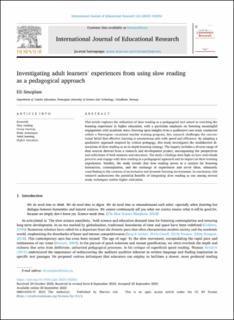Investigating adult learners' experiences from using slow reading as a pedagogical approach
Journal article
Published version
Permanent lenke
https://hdl.handle.net/11250/3102766Utgivelsesdato
2023Metadata
Vis full innførselSamlinger
- Institutt for lærerutdanning [3441]
- Publikasjoner fra CRIStin - NTNU [37703]
Originalversjon
International Journal of Educational Research Volume 122, 2023, 102252 https://doi.org/10.1016/j.ijer.2023.102252Sammendrag
This article explores the utilization of slow reading as a pedagogical tool aimed at enriching the learning experience in higher education, with a particular emphasis on fostering meaningful engagement with academic texts. Drawing upon insights from a qualitative case study conducted within a Norwegian vocational teacher training program, this research challenges the conventional belief that effective learning is synonymous only with speed and efficiency. By adopting a qualitative approach inspired by critical pedagogy, this study investigates the multifaceted dimensions of slow reading as an in-depth learning strategy. The inquiry includes a diverse range of data sources derived from a research and development project, encompassing the perspectives and reflections of both students and educators. The study’s findings shed light on how individuals perceive and engage with slow reading as a pedagogical approach and its impact on their learning experiences. Notably, the study reveals that slow reading serves as a catalyst for fostering interaction, contemplation, and the exchange of experiences and novel ideas, ultimately contributing to the creation of an inclusive and dynamic learning environment. In conclusion, this research underscores the potential benefits of integrating slow reading as one among several study techniques within higher education. Investigating adult learners' experiences from using slow reading as a pedagogical approach

